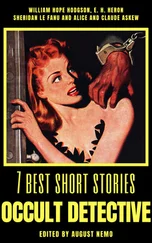1 ...8 9 10 12 13 14 ...20 Somewhere about the year 1794, the younger brother of a certain baronet, whom I shall call Sir James Barton, returned to Dublin. He had served in the navy with some distinction, having commanded one of His Majesty’s frigates during the greater part of the American war. Captain Barton was apparently some two or three-and-forty years of age. He was an intelligent and agreeable companion when he pleased it, though generally reserved, and occasionally even moody.
In society, however, he deported himself as a man of the world, and a gentleman. He had not contracted any of the noisy brusqueness sometimes acquired at sea; on the contrary, his manners were remarkably easy, quiet, and even polished. He was in person about the middle size, and somewhat strongly formed — his countenance was marked with the lines of thought, and on the whole wore an expression of gravity and melancholy. Being, however, as I have said, a man of perfect breeding, as well as of good family and in affluent circumstances, he had, of course, ready access to the best society of Dublin without the necessity of any other credentials.
In his personal habits Mr. Barton was unexpensive. He occupied lodgings in one of the then fashionable streets in the south side of the town — kept but one horse and one servant — and though a reputed free-thinker, yet lived an orderly and moral life — indulging neither in gaming, drinking, nor any other vicious pursuit — living very much to himself, without forming intimacies, or choosing any companions, and appearing to mix in gay society rather for the sake of its bustle and distraction, than for any opportunities it offered of interchanging thought or feeling with its votaries.
Barton was, therefore, pronounced a saving, prudent, unsocial sort of fellow, who bid fair to maintain his celibacy alike against stratagem and assault, and was likely to live to a good old age, die rich, and leave his money to an hospital.
It was now apparent, however, that the nature of Mr Barton’s plans had been totally misconceived. A young lady, whom I shall call Miss Montague, was at this time introduced into the gay world by her aunt, the Dowager Lady L——. Miss Montague was decidedly pretty and accomplished, and having some natural cleverness and a great deal of gaiety, became for a while a reigning toast.
Her popularity, however, gained her for a time nothing more than that unsubstantial admiration which, however pleasant as an incense to vanity, is by no means necessarily antecedent to matrimony — for, unhappily for the young lady in question, it was an understood thing that, beyond her personal attractions, she had no kind of earthly provision. Such being the state of affairs, it will readily be believed that no little surprise was consequent upon the appearance of Captain Barton as the avowed lover of the penniless Miss Montague.
His suit prospered, as might have been expected, and in a short time it was communicated by old Lady L—— to each of her hundred-and-fifty particular friends in succession, that Captain Barton had actually tendered proposals of marriage, with her approbation, to her niece, Miss Montague, who had, moreover, accepted the offer of his hand, conditionally upon the consent of her father, who was then upon his homeward voyage from India, and expected in two or three weeks at the furthest.
About this consent there could be no doubt — the delay, therefore, was one merely of form — they were looked upon as absolutely engaged, and Lady L— — with a rigour of old-fashioned decorum with which her niece would, no doubt, gladly have dispensed, withdrew her thenceforward from all further participation in the gaieties of the town.
Captain Barton was a constant visitor, as well as a frequent guest at the house, and was permitted all the privileges of intimacy which a betrothed suitor is usually accorded. Such was the relation of parties, when the mysterious circumstances which darken this narrative first began to unfold themselves.
Lady L—— resided in a handsome mansion at the north side of Dublin, and Captain Barton’s lodgings, as we have already said, were situated at the south. The distance intervening was considerable, and it was Captain Barton’s habit generally to walk home without an attendant, as often as he passed the evening with the old lady and her fair charge.
His shortest way in such nocturnal walks lay, for a considerable space, through a line of street which had as yet merely been laid out, and little more than the foundations of the houses constructed.
One night, shortly after his engagement with Miss Montague had commenced, he happened to remain unusually late, in company with her and Lady L——. The conversation had turned upon the evidences of revelation, which he had disputed with the callous scepticism of a confirmed infidel. What were called “French principles” had in those days found their way a good deal into fashionable society, especially that portion of it which professed allegiance to Whiggism, and neither the old lady nor her charge were so perfectly free from the taint as to look upon Mr. Barton’s views as any serious objection to the proposed union.
The discussion had degenerated into one upon the supernatural and the marvellous, in which he had pursued precisely the same line of argument and ridicule. In all this, it is but truth to state, Captain Barton was guilty of no affectation — the doctrines upon which he insisted, were, in reality, but too truly the basis of his own fixed belief, if so it might be called; and perhaps not the least strange of the many strange circumstances connected with my narrative was the fact that the subject of the fearful influences I am about to describe was himself, from the deliberate conviction of years, an utter disbeliever in what are usually termed preternatural agencies.
It was considerably past midnight when Mr. Barton took his leave and set out upon his solitary walk homeward. He had now reached the lonely road, with its unfinished dwarf walls tracing the foundations of the projected row of houses on either side — the moon was shining mistily, and its imperfect light made the road he trod but additionally dreary — that utter silence which has in it something indefinably exciting reigned there and made the sound of his steps, which alone broke it, unnaturally loud and distinct.
He had proceeded thus some way, when he, on a sudden, heard other footfalls, pattering at a measured pace, and, as it seemed, about two score steps behind him.
The suspicion of being dogged is at all times unpleasant: it is, however, especially so in a spot so lonely: and this suspicion became so strong in the mind of Captain Barton, that he abruptly turned about to confront his pursuer, but, though there was quite sufficient moonlight to disclose any object upon the road he had traversed, no form of any kind was visible there.
The steps he had heard could not have been the reverberation of his own, for he stamped his foot upon the ground, and walked briskly up and down, in the vain attempt to awake an echo; though by no means a fanciful person, therefore, he was at last fain to charge the sounds upon his imagination, and treat them as an illusion. Thus satisfying himself he resumed his walk, and before he had proceeded a dozen paces the mysterious footfall was again audible from behind, and this time, as if with the special design of showing that the sounds were not the responses of an echo, the steps sometimes slackened nearly to a halt, and sometimes hurried for six or eight strides to a run, and again abated to a walk.
Captain Barton, as before, turned suddenly round, and with the same result — no object was visible above the deserted level of the road. He walked back over the same ground, determined that, whatever might have been the cause of the sounds which had so disconcerted him, it should not escape his search — the endeavour, however, was unrewarded.
Читать дальше












